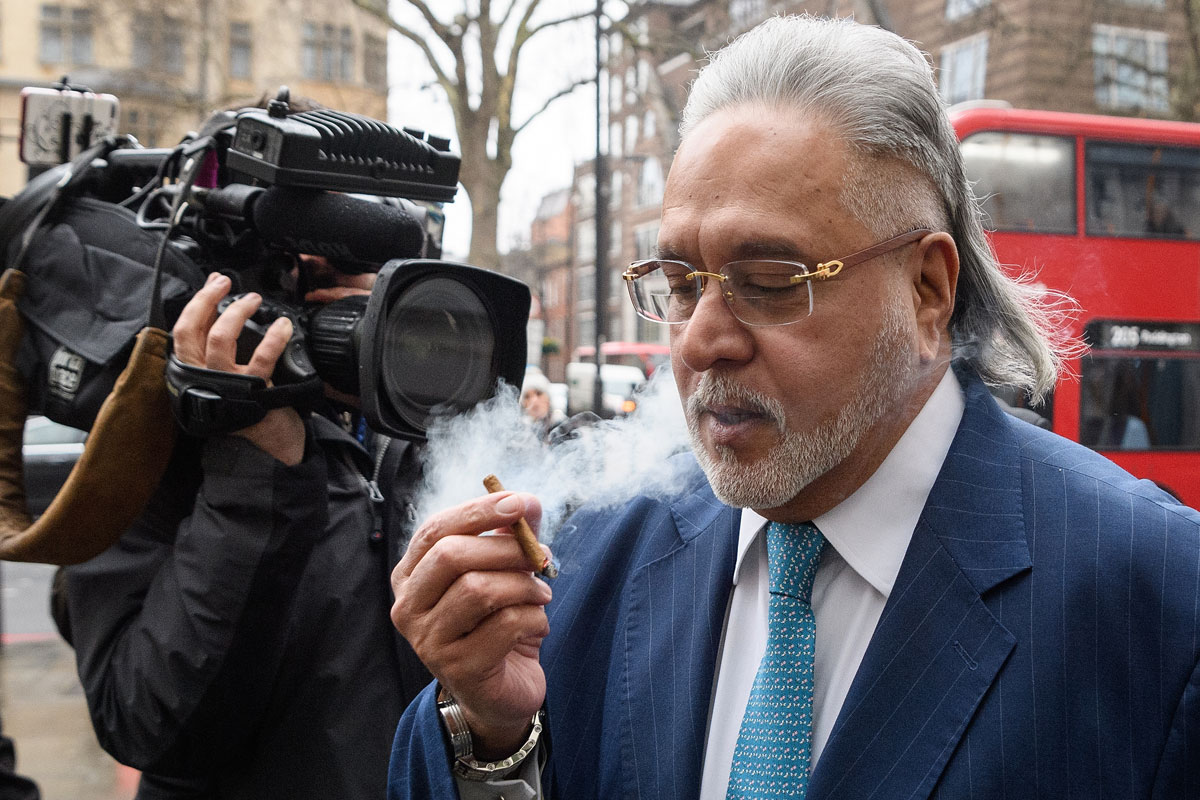UK Court Allows Three-fold Increase in Mallya’s Weekly Allowance
F1 Force India team boss Vijay Mallya walks through the press as he arrives at The City of Westminster Magistrates Court on Jan. 11, in London, England. The Indian liquor tycoon is wanted in India on charges of fraud and money laundering. (Leon Neal/Getty Images)
Vijay Mallya, the embattled liquor baron wanted in India on charges of fraud and money laundering, will get over £18,000 weekly – a three-fold increase – as “ordinary living expenses allowance” following a recent UK High Court order, writes Aditi Khanna.
Mallya’s lawyers had applied to the court for additional living expenses as part of an estimated $1.5-billion worldwide freezing order against the 62-year-old businessman last year.
In an order dated January 30, Justice Robin Knowles permitted the increase in Mallya’s “ordinary living expenses allowance” to a maximum of £18,325.31 a week.
“This order does not prohibit the First Respondent (Mallya) from spending £18,325.31 a week, to be aggregated quarterly, towards his ordinary living expenses,” the court order states.
The allowance is believed to be a considerable boost on an estimated £5,000 a week figure initially permitted by the court following a judgment of the Debt Recovery Tribunal (DRT) in Karnataka, India, last year.
The litigation in the Queen’s Bench Division of the Commercial Court in England’s High Court of Justice dates back to November 24, 2017, and lists 13 Indian banks as claimants the State Bank of India, Bank of Baroda, Corporation bank, Federal Bank Ltd, IDBI Bank, Indian Overseas Bank, Jammu &a Kashmir Bank, Punjab & Sind Bank, Punjab National Bank, State Bank of Mysore, UCO Bank, United Bank of India and JM Financial Asset Reconstruction Co. Pvt. Ltd.
Mallya and related concerns Ladywalk LLP, Rose Capital Ventures Ltd and Orange India Holdings are listed as defendants.
The freezing order relates to Mallya and his concerns being restrained from removing from the jurisdiction any of their assets in the jurisdiction up to a limit of £1,145,000,000 and in any way disposing of, dealing with or diminishing the value of any of their assets whether they are inside or outside the jurisdiction up to the same value.
A full hearing in the case, which falls under the UK’s Foreign Judgments (Reciprocal Enforcement) Act 1933, is so far listed for April 12 and expected to last two days.
The court order of additional living expenses comes in the wake of the UK-based tycoon suffering a legal setback when the UK High Court awarded Singapore-headquartered BOC Aviation an estimated $90 million in claims earlier this month against Mallya’s now-defunct Kingfisher Airlines.
Meanwhile, the Indian government s extradition case against Mallya is set to come up for one of its final hearings before Chief Magistrate Emma Arbuthnot at Westminster Magistrates’ Court in London on March 16, with a judgment expected in May.
The businessman remains on a £650,000 bail bond, extended until April 2 at the last hearing in the trial in January.
Mallya had been arrested on an extradition warrant by Scotland Yard in April last year and has since been appearing for the extradition trial, which opened on December 4 last year to establish if he can be forced to return to India to face charges of fraud and money laundering involving Kingfisher Airlines default of bank loans allegedly worth nearly Rs 9,000 crores.
The Crown Prosecution Service (CPS), representing the Indian government, has claimed that the evidence they have presented confirms dishonesty on the part of the businessman and that there are no bars to him being extradited from the UK to face Indian courts.
Mallya’s defense team has deposed a series of expert witnesses to claim he had no fraudulent intentions and that he is unlikely to get a fair trial in India.
When the trial returns next month, the judge will hear concluding arguments on the admissibility of some of the evidence presented by the CPS, on behalf of the Indian authorities, before determining a timeline for her ruling in the case.


